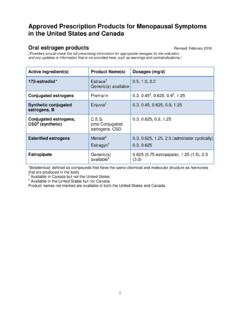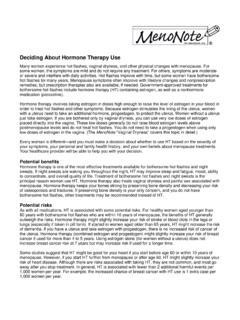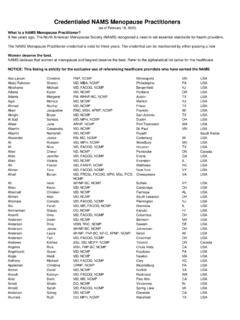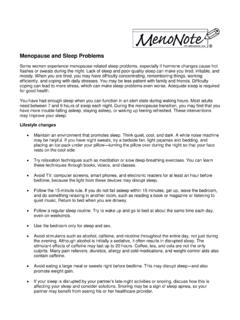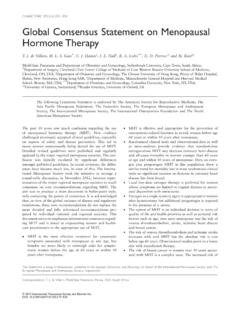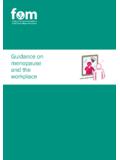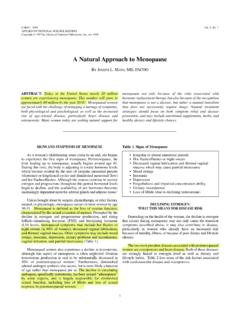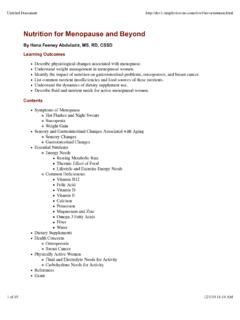Transcription of A1-GME 05 18 NAMS LateBreaking - menopause.org
1 VOLUME 25, ISSUE 5 2018Co n t e n t sEditorials471 Menopausal urogenital changes: welcome expansion of management options over the past 25 yearsGloria Bachmann, MD476 Concern about US Preventive Services Task Force recommendation on hormone therapy for the primary prevention of chronic conditions in postmenopausal womenJoAnn V. Pinkerton, MD, Andrew M. Kaunitz, MD, and JoAnn E. Manson, MD, DrPH477 Hormonal contraception and risk of breast cancer: a closer lookAndrew M. Kaunitz, MD, FACOG, NCMP, JoAnn V. Pinkerton, MD, FACOG, NCMP, and JoAnn E. Manson, MD, DrPH, FACP, NCMP480 Hysterectomy with ovarian conservation: is there a downside?James H. Liu, MD481 Estrogen therapy: economic considerationsPhilip M. Sarrel, MDMenopauseThe Journal of The North American menopause Society(continued) menopause : The Journal of The North American menopause Society (ISSN 1072-3714) is published monthly for The North American menopause Society by Wolters Kluwer Health, Inc.
2 , at 14700 Citicorp Drive, Bldg 3, Hagerstown, MD 21742. Business and production offices are located at Two Commerce Square, 2001 Market St., Philadelphia, PA 19103. All rights reserved. Printed on acid-free paper. Periodical postage paid at Hagers-town, Maryland, and at additional mailing offices. Copyright 2018 by The North American menopause Society. POSTMASTER: Send address changes to menopause : The Journal of The North American menopause Society, Box 1610, Hagerstown, Access Digital Content is (continued)Original Articles483 Cardiovascular and metabolic morbidity after hysterectomy with ovarian conservation: a cohort studyShannon K. Laughlin-Tommaso, MD, MPH, Zaraq Khan, MBBS, Amy L. Weaver, MS, Carin Y. Smith, BS, Walter A. Rocca, MD, MPH, and Elizabeth A. Stewart, MDEven with ovarian conservation, hysterectomy is associated with a significantly increased risk of several cardiovascular diseases and metabolic conditions, even after adjusting for cardiovascular diseases and metabolic conditions diagnosed before hysterectomy, and for several additional possible confounders.
3 If these associations are causal, they have both scientific and clinical and associated cost savings among women who were prescribed systemic conjugated estrogens therapy compared with those without menopausal therapyWing Yu Tang, MPH, Dale Grothe, PharmD, BCPP, Allison Keshishian, MPH, Diana Morgenstern, MD, FACP, and Seema Haider, MSCIn this study, postmenopausal women with vasomotor symptoms who were prescribed oral conjugated estrogens had a significantly greater reduction in health care costs after treatment initiation compared to untreated postmenopausal between improvement in genitourinary symptoms of menopause and changes in the vaginal ecosystemCaroline M. Mitchell, MD, MPH, Sujatha Srinivasan, PhD, Anna Plantinga, BS, Michael C. Wu, PhD, Susan D. Reed, MD, MPH, Katherine A. Guthrie, PhD, Andrea Z.
4 LaCroix, PhD, Tina Fiedler, BS, Matthew Munch, BS, Congzhou Liu, MS, Noah G. Hoffman, MD, PhD, Ian A. Blair, PhD, Katherine Newton, PhD, Ellen W. Freeman, PhD, Hadine Joffe, MD, MSc, Lee Cohen, MD, and David N. Fredricks, MDPostmenopausal women with a Lactobacillus-dominant vaginal microbiota were more likely to have improvement of genitourinary symptoms over 8 weeks of follow cognitive behavior therapy for working women with problematic hot flushes and night sweats (MENOS@Work): a multicenter randomized controlled trialClaire Hardy, PhD, Amanda Griffiths, PhD, Sam Norton, PhD, and Myra S. Hunter, PhDThis multicenter randomized controlled trial examines the efficacy of an unguided, self-help cognitive behavior therapy booklet on hot flush and night sweat problem rating, delivered in a work setting.
5 Positive outcomes are evident for the prime outcome, as well as work and social adjustment; additional work related outcomes are symptom characteristics: are they risk factors for incident diabetes?Kristen E. Gray, PhD, Jodie G. Katon, PhD, Erin S. LeBlanc, MD, MPH, Nancy F. Woods, PhD, RN, Lori A. Bastian, MD, MPH, Gayle E. Reiber, PhD, Julie C. Weitlauf, PhD, Karin M. Nelson, MD, MSHS, and Andrea Z. LaCroix, PhDThe menopausal transition may be an optimal time for clinicians to discuss future diabetes risk with patients and assist in decision-making around symptom management, which may include strategies that both improve symptoms and decrease diabetes (continued)531 Severe menopausal symptoms associated with reduced adherence to antiretroviral therapy among perimenopausal and menopausal women living with HIV in Metro VancouverPutu K.
6 Duff, MSc, PhD, Deborah M. Money, MD, FRCSC, Gina S. Ogilvie, MD, MSc, FCFP, DrPh, Florence Ranville, Mary Kestler, MD, Melissa C. Braschel, MSc, Neora Pick, MD, Kate Shannon, MPh, PhD, on behalf of the SHAWNA ProjectThis study found that severe menopausal symptoms, injection drug use, and gender-based violence were positively associated with poor adherence to antiretroviral between the age-related decline in renal function and lumbar spine bone mineral density in healthy Chinese postmenopausal womenWen Han, PhD, Xiao-Juan Bai, MD, Lu-Lu Han, PhD, Sebastian Akhtari, BS, Xue-Feng Sun, PhD, and Xiang-Mei Chen, PhDThis study applied Pearson s correlation and binary logistic regression analyses to evaluate the association between estimated glomerular filtration rate and lumbar spine bone mineral density (LBMD).
7 Renal function decline was independently associated with decreased LBMD in healthy Chinese postmenopausal of age at menarche with obesity and hypertension among southwestern Chinese women: a new findingGang Liu, MD, Yuan Yang, MD, Wei Huang, MD, PhD, Nan Zhang, MD, Fan Zhang, MD, Ge Li, MD, and Han Lei, MDThis study reports that late menarche is associated with a high risk of hypertension and a low risk of obesity among southwestern Chinese ventricular remodeling and arterial afterload in older women with uncontrolled and controlled hypertensionJeung-Ki Yoo, PhD, Yoshiyuki Okada, PhD, Stuart A. Best, PhD, Rosemary S. Parker, MS, Michinari Hieda, MD, Benjamin D. Levine, MD, and Qi Fu, MD, PhDRegardless of current blood pressure control, hypertensive women exhibited increased cardiac mass and arterial stiffness compared to normotensive registrar consultations addressing menopause -related symptoms: a cross-sectional analysisJasmine M.
8 De Giovanni, Amanda Tapley, BBiomedSc (Hons), MMedStat, Penny , MBBS, FRACGP, BA, Andrew R. Davey, BSc, BE (Hons), DCH, BMed, MClinEpid, FRACGP, Mieke L. van Drie, MD, MSc, PhD, FRACGP, Kim M. Henderson, BNurs, Nigel F. Catzikiris, BE (Envl) (Hons), BExSci, Katie J. Mulquiney, BND,Simon Morgan, MBBS, MPH, FRACGP, Neil A. Spike, MBBS, FRACGP, Rohan H. Kerr, MBBS, FRACGP, FARGP, and Parker J. Magin, PhD, FRACGPThe findings of this study suggest that registrars have considerable learning needs in the area of management of menopausal (continued)Clinical CornerNAMS Practice Pearl571 Vulvar and vaginal fractional CO2 laser treatments for genitourinary syndrome of menopauseLauren F. Streicher, MDGiven the significant unmet need in treating distressing symptoms of the genitourinary syndrome of menopause in some women, clinicians are beginning to offer treatment with the fractionated CO2 laser as an alternative to those who prefer or have been advised not to use pharmacologic therapy, despite the limited available efficacy and safety data.
9 Here is what we know and what we don t Report574 The cross-sectional association between chemerin and bone health in peri/pre and postmenopausal women: results from the EPIC-Potsdam studyJuliane Menzel, PhD, MSc, Ronald Biemann, PhD, Krasimira Aleksandrova, PhD, MPH, Matthias B. Schulze, DrPH, Heiner Boeing, PhD, MSc, Berend Isermann, MD, and Cornelia Weikert, MD, MPHThis study provides evidence for an inverse association between chemerin and broadband ultrasound attenuation (BUA) in peri- and premenopausal women. However, no association between chemerin and BUA in postmenopausal women was Kluwer Health, Inc., and The North American menopause Society cannot be held responsible for errors or for any consequences arising from the use of the information contained in this journal. All advertising material published in this journal is expected to conform to regulatory and medical standards.
10 The appearance of advertising in this publication does not constitute a guarantee or endorsement by The North American menopause Society or Wolters Kluwer Health, Inc., of the quality or value of such a product or service or any claims made by its TO PHOTOCOPY ARTICLES: This publication is protected by copyright. Permission to reproduce copies of articles for noncommer-cial use may be obtained from the Copyright Clearance Center, 222 Rosewood Drive, Danvers, MA 01923, Tel: (978) 750-8400, FAX: (978) 750-4470, URL: For permissions to reuse the material for other purposes: Please go to the Journal website and click the Permissions link above the title of the paper in the abstract or html window for the relevant article. Alternatively, send an email to Translation Rights & Licensing queries: Please contact, Silvia Serra, Translations Rights, Licensing & Permissions Manager, Wolters Kluwer Health (Medical Research) Ltd, 250 Waterloo Road, London SEI 8RD, UK.

